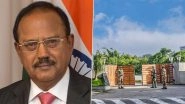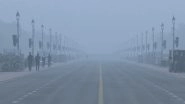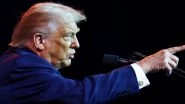Banja Luka, Dec 10 (AP) The Bosnian Serb parliament convened on Friday to vote on steps that would weaken the war-ravaged Balkan country's central authority. The session came as the Bosnian Serb leader is stepping up his secession campaign despite a threat of new U.S. and other sanctions.
Lawmakers are expected to vote on starting a procedure for Bosnian Serbs to withdraw from the Bosnian army, security services, tax system and judiciary. That would be another substantial move following repeated threats by Bosnian Serb leader Milorad Dodik to secede, which could lead to about half of Bosnia being incorporated with neighboring Serbia.
Also Read | China's Real Estate Collapse Trigger Financial Meltdown Like US Subprime Crisis?.
Dodik, the Bosnian Serb member of the tripartite Bosnian presidency, said Friday's was a historic parliament session that would strengthen the Bosnian Serb mini state — formed as part of a U.S.-sponsored peace agreement that ended the Bosnian war in 1995.
Dodik called Bosnia a “paper state” and told parliament that a referendum should be held in the Serb entity in Bosnia on the formation of its own army, security service, high judiciary and tax authority and that a new state constitution should be drafted.
Also Read | UNHCR Expresses Concern About Rapid Migration Under Taliban Rule in Afghanistan.
Opposition leaders in the parliament criticized Dodik's policies, saying they are hasty, bring back uncertainty and even possible clashes to the still-volatile Balkan region.
Dodik has for years been advocating the separation of the Bosnian Serb semi-autonomous mini-state from Bosnia and having it become part of neighboring Serbia.
With tacit support from Russia and Serbia, Dodik recently intensified his campaign.
Bosniak officials have warned that Dodik's policies could lead to clashes, and called on the U.S. and the EU to crack down against him and his associates.
The United States has already imposed a travel ban and assets freeze on Dodik and both American and German officials have recently threatened more sanctions in case Bosnian Serbs further weaken Bosnia's central institutions.
Dodik has repeatedly said he doesn't care about new sanctions, adding that this would bring Serbs even closer to their “true friends” — Russia and China. He has also denied that withdrawal from the central institutions would lead to a quick secession or a new war.
There is likely to be a six-month delay before the assembly's decisions take effect while Dodik tries to renegotiate Bosnia's fragile makeup with the country's Bosniaks and Croats from a stronger position.
The Bosnian War started in 1992 when Bosnian Serbs, with the help of the Serb-led Yugoslav army, tried to create ethnically pure territories with an aim of joining Serbia. More than 100,000 people were killed and millions were left homeless during the worst bloodshed in Europe since World War II.
The war pitted Bosniaks, Serbs and Croats against each other and ended with the U.S.-sponsored peace agreement that created two regions, the Republika Srpska and the Bosniak-Croat Federation.
The two regions were given wide autonomy, but kept some joint institutions, including the army, the top judiciary and tax administration. Bosnia's three-member rotating presidency is made up of Bosniak, Serb and Croat members.
In a sign seen in Bosnia as support for Bosnia's joint armed forces, the U.S. on Friday delivered four new Bell Huey 2 multi-role helicopters to its air force. (AP)
(The above story is verified and authored by Press Trust of India (PTI) staff. PTI, India’s premier news agency, employs more than 400 journalists and 500 stringers to cover almost every district and small town in India.. The views appearing in the above post do not reflect the opinions of LatestLY)













 Quickly
Quickly


